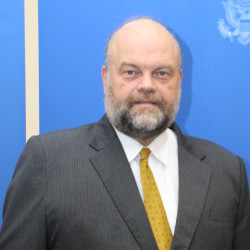By Ambassador Perry Holloway
United States of America Embassy Georgetown
GEORGETOWN—In the United States the press is often referred to as the “fourth estate” because it is viewed as independent and equally important to the legislative, executive, and judicial branches of government. The US Constitution, in the Bill of Rights, prohibits the making of any law infringing

on the freedom of the press. The press, in a free society, is expected to provide citizens with accurate news and information of the day. It is also responsible for holding government officials, private businesspeople, and non-governmental organization representatives accountable to the people of the country. In order to serve this critically important function, journalists must have “Access to Information and Fundamental Freedoms” — this year’s theme for World Press Freedom Day. They must also be free from any kind of punishment or retribution from people in powerful positions both in government and the private sector. At the same time, the journalists themselves need to be responsible and professional.
This year World Press Freedom Day is especially significant in Guyana because, as the government nears completion of its first full year in office, and on the heels of the first local government elections in over twenty-two years, the press has a critical role in educating and informing the public on issues that are going to have a lasting impact for years to come. Issues of transparency and accountability, the effective and efficient use of natural resources such as oil, gold, and timber, gender equality, health care, prison reform and the justice system, and so much more, must be part of a robust public discussion in a thriving democracy like Guyana.
As Guyana approaches its 50th anniversary of independence it must continue institutional and capacity building not only for growth in physical infrastructure, but also in the area of intellectual freedom and growth of the press in protecting the advances the country has made thus far.
The next 50 years are likely to see tremendous change as Guyana is poised to transform from one of the poorest nations in the region to one of the wealthiest, and it will need a free press to make this transition successfully.
Former President of South Africa Nelson Mandela once said “A critical, independent and investigative press is the lifeblood of any democracy. The press must be free from state interference. It must have the economic strength to stand up to the blandishments of government officials. It must have sufficient independence from vested interests to be bold and inquiring without fear or favour. It must enjoy the protection of the constitution, so that it can protect our rights as citizens.” President Obama echoes this sentiment and has called on “all governments to protect the ability of journalists, bloggers, and dissidents to write and speak freely without retribution.”
The Universal Declaration of Human Rights proclaims the right of every person “to seek, receive and impart information and ideas through any media and regardless of frontiers.” I look forward to working with all stakeholders to ensure that right is enjoyed by all citizens in the Cooperative Republic of Guyana. As we celebrate 50 years of diplomatic relations with Guyana, we recognize our shared values of freedom and democracy and will continue to work together to make the “Land of Many Waters” more safe, secure, and inclusive.




